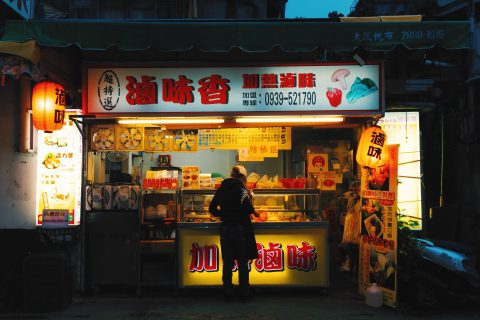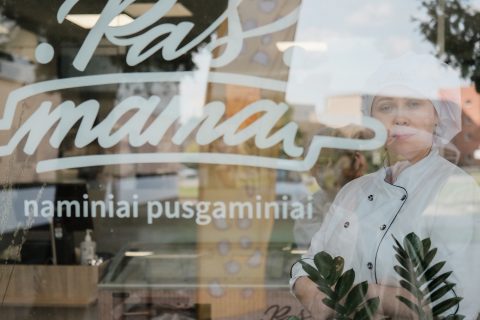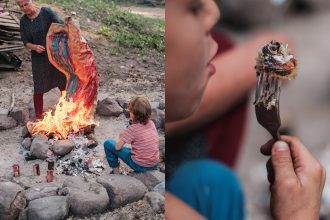For the past four years, during my lunch break, I find myself in the center of Kaunas with a daily task: to find a place where I can have a delicious lunch. After exploring the part closer to the Church of St. Michael the Archangel, I sometimes go towards Ožeškienės Street, where just a year ago, after stopping by Vilties (en. Hope) pharmacy, I discovered Arbatinė (en. Teahouse).
According to the old residents of Kaunas, it is one of the three legendary places left in the center of Kaunas (together with Spurginė and the canteen next to the Church of St. Michael the Archangel). It has been operating since 1997 and offers Lithuanian vegan food. When I visited the place this time, its head Arūnas Šiaučiulis told me about the behind-the-scenes of the cafe and shared one vegan recipe.


“In 2025, Vilties pharmacy will celebrate its 100th anniversary,” the pharmacist and head of the institution announced to us. As soon as you step inside, your attention is drawn to the marble floor, the ceiling made of plastic tubes, and the crystal chandeliers sparkling overhead, which is quite unusual to see in an ordinary pharmacy or a coffee shop these days. “At that time, the pharmacy was one of the largest, although there were only 27 in Kaunas in total. All of them were also the manufacturing ones: they were producing medicines. And now there are about 300 pharmacies in the city,” the interviewee explained.
Vilties pharmacy, where Arbatinė is also located, moved to the current premises in 1958. There was supposed to be a radio store here, but the authorities decided to give the premises to the pharmacy. “These premises are not the most suitable for that. There are many steps and small rooms, and the ceiling is very high: 6 meters. As for the cafe, of course, it is more suitable. The room is more charming, and the high ceilings really don’t get in anyone’s way,” Arūnas added.




While walking around with the manager, I saw the dark red felt walls and winding stairs, which reminded me of a theatre. I also saw production rooms and the space that is hidden behind Arbatinė’s doors. After looking around, I finally decided to ask the most important question: how did the idea come up to sell food next to the pharmacy? “In 1991, the country experienced the sort of emptying of farmsteads. The pharmacies ran out of medicines. Before that, we had an “umbilical cord” with Moscow, we received everything through Russia. We could no longer buy anything directly, so everything collapsed. We had to seek other suppliers. Thus, in 1993 – 1994, the pharmacy also engaged in wholesale. We acquired a license for the import of medicines to Lithuania, and we began to transport medicines ourselves from Kyiv, Ukraine. We stored everything in the basement of the pharmacy and tried to supply the whole country. However, the authorities did not like it, many questions arose: how do we get everything here, how did we overtake others and why are the prices so low? A good example is insulin tablets, which used to cost 65 kopecks elsewhere, but only 8 kopecks here – that was enough for us. In the end, our license was not renewed, even though I was the vice president of the Pharmaceutical Union, and I also held public positions. After some time, another company named Vičys appeared, we paled into insignificance, and stayed on the sidelines, and the supply of medicines also improved, so we had to look for other activities. That’s how one day the idea of opening a tasting bar came to mind,” Arūnas said.
That is how Arbatinė was born in 1997. Of course, in the beginning, the plans were very different. There were ideas to sign contracts with farmers and sell vegetables, we even tried that, but people didn’t like it – everyone wanted to eat.



Water-based varnish, water-based paints, wood, and ceramics. Everything was environmentally friendly because the founders sought to be as they presented themselves to the public: completely healthy. Starting with the interior materials and finishing with the menu, which contained only Lithuanian vegan food.
“I remember the cooks used to analyze various recipes and then adapt them to our kitchen. Where necessary, they removed the sour cream or mayonnaise and replaced it with something else suitable for vegans. After various experiments, we can now offer our customers more than 90 cooked dishes. However, we do not prepare most of them often. Some dishes did not catch on. We notice that people tend to choose those dishes that they know, for example, cepelinai (lt. potato dumplings),” the manager said. In addition to Lithuanian vegan food, you can also find pastries here, the recipes of which have not changed since the opening of the cafe. “We learned how to bake it from this Dutchman. He had come to Vilnius, and we had to meet him with a translator to be able to talk. And after that, we visited him again with the chef and learned everything in three days. We follow those recipes and make everything by ourselves to this day. After all, we are a teahouse, we always need to have something to accompany coffee or tea,” Arūnas added.
The same pastries have been warming up the stomachs of Arbatinė customers since 1997, but that does not mean that the menu never changes – the chefs occasionally experiment. The head of the establishment mentioned that a new dish with kale should appear soon. Apparently, a while ago, people did not like this vegetable but now it has become popular because this edible leaf is really good for the body, and it can be both fried and stewed. In addition, the dishes change due to seasons. “When wild blueberries are in season, we cook with them. I don’t think we should eat strawberries in winter or throughout the year. I associate it with summer and lighter food like gazpacho or cold beetroot soup. In the fall we offer pickled cucumbers, tomatoes, Ukrainian borscht, potato pudding, cepelinai and potato pancakes, after all, it is the potato harvest time, and you want heavier, more caloric food. And if people want a fried pork fillet, we have it, only it is made from soy. Soy is tasteless, odorless, so it can acquire the flavor of whatever you soak it in. You want to eat meat, but you can’t? Cook it in beef broth and it will taste like real meat. Of course, we can’t do that, so we cook it in vegetable broth, but we add all kinds of spices and thus give it a unique taste. You eat it as if it was meat, but it doesn’t taste like meat,” the hero of this story was telling us while on the move with a menu in his hands.
I myself heard more than once when talking about Arbatinė with friends that food there is as tasty as at mom’s. And it’s not surprising at all – the food is Lithuanian, simple, without any unusual surprises. The most important thing is that everything is healthy and without any lies – the menu is 100 percent suitable for vegans, which is not so common even in today’s Lithuania. “We used to think that we were unknown, uninteresting, but in the long run we realized that everything is fine. We used to have this slogan on the door: “Our food must be our medicine, and our medicine must be our food”, unfortunately we had to take it down because the city said it was advertisement,” Arūnas Šiaučiulis recalled.
“Why do you think Arbatinė is necessary for today’s Kaunas?” I asked at the table while waiting for my delicious lunch. “The pharmacy is called Vilties (lt. Of hope) and Arbatinė (lt. Teahouse) was born out of despair, but survived and is now celebrating its 26th anniversary,” the interviewee answered with a smile. In the past, this space where Arbatinė now operates used to be a pharmaceutical laboratory where medicines were produced. There were also old crystal chandeliers hanging from the ceiling. According to the manager, the same ones as in the National Opera and Ballet Theatre. It is a pity they had to be removed because it was collecting a lot of dust. There are a few left in the pharmacy, through which I recommend you enter Arbatinė. Pay attention to the marble floor, ceiling, and furniture and go through the glass door to a cozy cafe, where you will be greeted by a smiling barmaid.

Buckwheat zrazy
Arbatinė offers this dish for lunch. “Beetroot burgers and potato pancakes have become our most popular meals, but we decided to try something different. This dish comes from the old days and is not that well known today. Grandmothers used to make it; the recipe comes from Kaunas. It can be made with all kinds of fillings, but we chose buckwheat with spinach.”
Everything is very simple: you boil buckwheat and add a little starch to bind everything together. You form a patty and we put chopped spinach, carrots, and onions inside. We serve it with green vegetables and your preferred sauce.


All photos by Gražvydas Jovaiša




